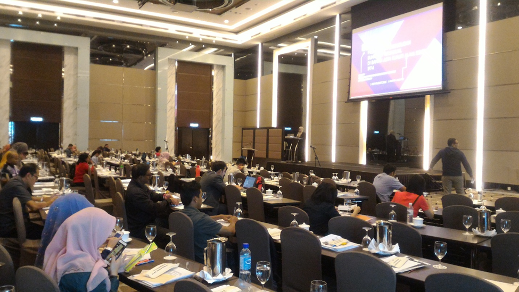A “workshop on compliance with scheduled waste management under the ‘Environmental Quality Act 1974’” was held in Malaysia on November 1, 2018. The workshop was organized by the Department of Environment, under the Ministry of Energy, Science, Technology, Environment and Climate Change, to introduce the legal requirements, cases of violations, and future management policies regarding “scheduled waste.” More than 250 people including the local partners of EnviX attended the workshop. The agenda of the workshop was as follows.
- Application for special management or reuse of scheduled waste under regulation 7 of the Environmental Quality (Scheduled Wastes) Regulations 2005
- Special management of waste: Cradle to Cradle
- Environmental legislation: scheduled waste
- Moving forward with eSWIS
- Cases of non-compliance in the management of or on the inspection of scheduled waste

Current status and cases of violations regarding scheduled waste management
Despite the existence of the hazardous waste (scheduled waste) regulations in Malaysia, illegal dumping of such waste still occurs. The main reasons as analyzed by the Department of Environment are as follows.
- The social awareness is still low.
- Stakeholders being self-serving, focusing on their own interests.
- The number of illegal factories is increasing.
- The cost necessary for disposal and treatment is too high.
- The law enforcement is weak.
- There is a problem with the integrity of the enforcement agencies.
The Department of Environment noted that the following cases of violations are frequently observed during inspections of factories.
- The proper label is not affixed, or the labelling is inadequate.
- Lack of proper storage space.
- The storage area is not maintained properly.
- Use of inappropriate storage containers.
- Storage for more than 180 days.
Future policies on scheduled waste management
Under the current system, scheduled waste is sent from the waste generators to landfills or treatment facilities for disposal. Instead, in the future, the concept of environmental friendliness and waste reduction will be emphasized, and the direction of reusing waste as a resource will be put forward. To this end, the current “Environmental Quality (Scheduled Wastes) Regulations 2005” will be amended, and new regulations that incorporate the concepts of 4Rs (reduce, reuse, recycle, and recover) and shared responsibility will be promulgated.
Based on this idea, the concept of “industrial ecology” has already been implemented in Malaysia. This concept is to create an eco-system that utilizes waste constantly by gathering “waste generators” and “businesses that can make use of waste as a resource” in the same industrial park. The advantage of this concept is that the waste can be easily collected and transported since they are all located in one industrial park. There are several industrial parks in Malaysia that have adopted this concept, including Samalaju Industrial Park in Bintulu, Sarawak.
Questions and Answers
Q: Does the Department of Environment grasp that the licensed treatment facilities (businesses) are imposing a surcharge for transporting small amounts of waste?
A: We encourage you to report any such issues to the state environmental department. Then we, the state environmental department, will consult with the Department of Environment, consider countermeasures, and make actions when necessary. However, in the first place, this kind of problem should not actually occur. Since they have received permission from us, they should accept even small amounts of waste. The purpose of these treatment facilities is not only to generate profit, but also to eliminate illegal dumping of scheduled waste. If such problems continuously occur, the license will be rescinded.
Q: Please tell us about the direction of regulations regarding household E-waste.
A: We are currently preparing for the “Household E-waste Regulation,” which will control the generation, transportation, and disposal of E-waste. As you may already know, we are currently running an E-waste collection campaign, and E-waste such as computers, refrigerators, and washing machines are being recycled in licensed facilities. We want to avoid sending them to disposal facilities as much as possible.
 Workshop on scheduled waste management held in Malaysia
Workshop on scheduled waste management held in Malaysia 
























